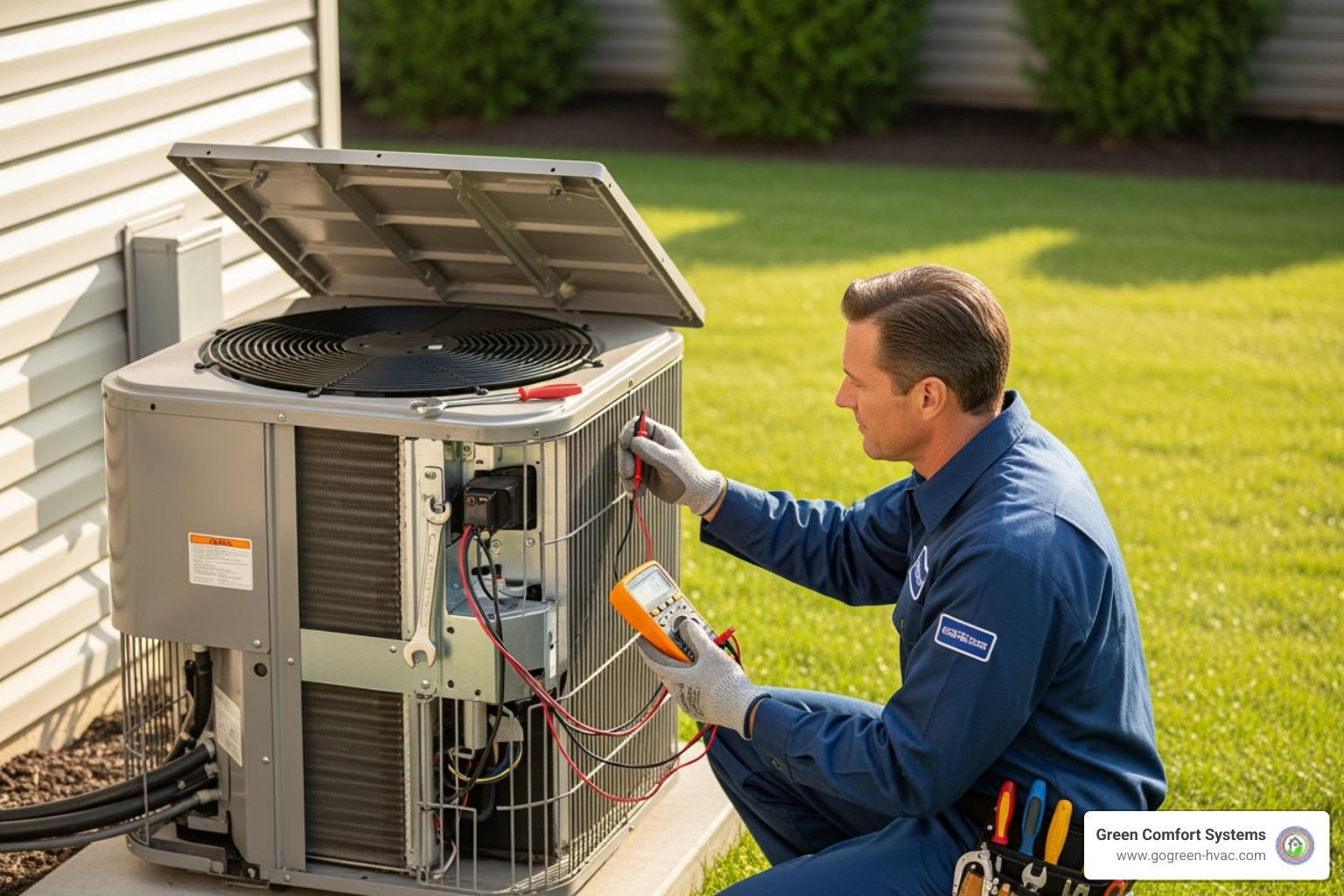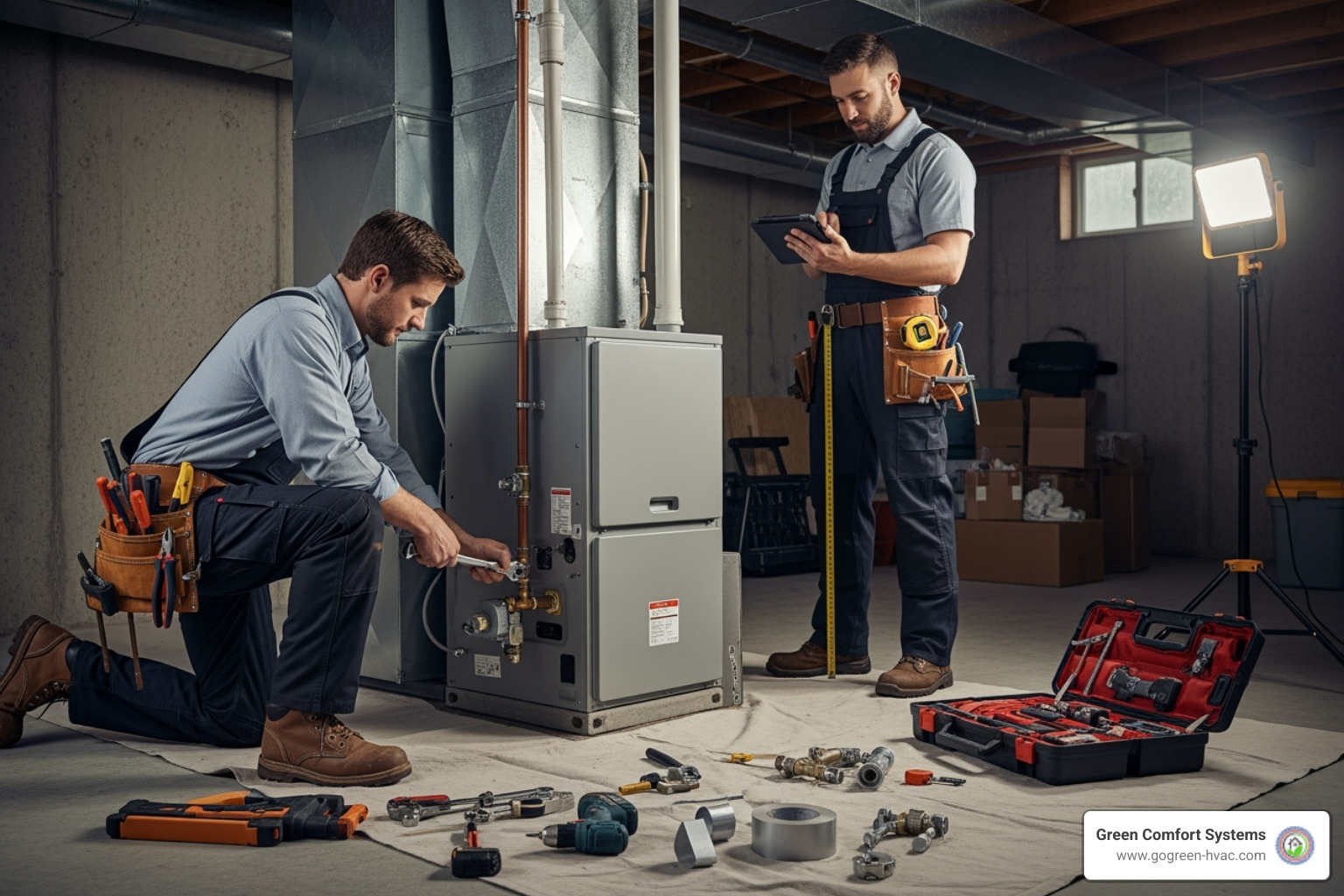Keeping Your Business Running: Comprehensive Commercial Repair Solutions

Why Gas Line Safety Is Critical for Your Commercial Property
Gas line repair is one of the most serious maintenance issues a commercial property can face. A failing gas line doesn't just threaten business operations—it puts lives at risk.
If you suspect a gas leak:
- Evacuate immediately - Get everyone to a safe location.
- Call the gas company - Contact your utility provider's emergency line from a safe distance.
- Don't use electrical switches - Avoid creating any sparks.
- Call a licensed professional - Schedule immediate repair service.
- Don't return - Wait for the all-clear from professionals.
Natural gas powers essential commercial systems, from kitchen equipment to boilers. Since gas is odorless, utility companies add mercaptan to create a distinctive rotten egg smell that helps detect leaks.
A single gas leak can shut down your business, force an evacuation, and create serious liability. Worse, leaks can lead to fires, explosions, or carbon monoxide poisoning. Common warning signs include the sulfur smell, hissing sounds, dead vegetation near outdoor lines, and physical symptoms like dizziness in staff.
Fortunately, most gas line problems are preventable with proper maintenance and prompt professional repairs.
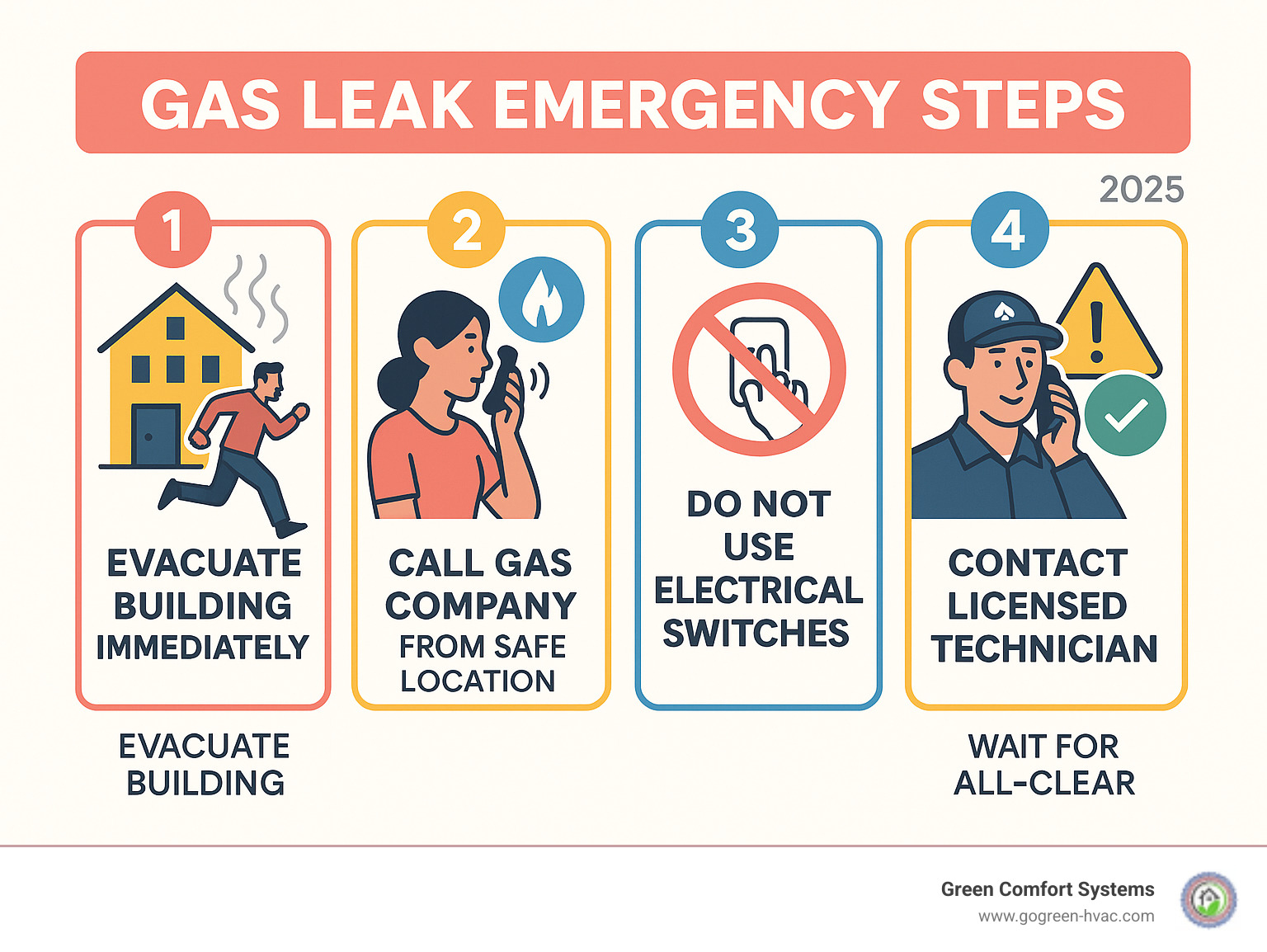
Critical Signs Your Commercial Gas Line Needs Attention
As a property manager, you know that paying attention to your building's systems can be life-saving. This is especially true for gas lines. This section covers how to identify a problem and its common causes.
Recognizing the Telltale Signs of a Gas Leak
Recognizing a gas line issue is the first step. Natural gas is given a strong rotten egg or sulfur smell to help you detect leaks. This is the most significant warning sign.
Other critical signs include:
- Hissing Sounds: Whistling or roaring sounds near a gas line, meter, or appliance suggest gas is escaping.
- Dead or Discolored Vegetation: Patches of dead grass or shrubs near an outdoor gas line can indicate an underground leak, as gas displaces oxygen in the soil.
- Bubbling in Wet Areas: Bubbles rising through puddles or wet ground near a buried line are a clear sign of escaping gas.
- Physical Symptoms in Occupants: Exposure to natural gas or carbon monoxide (CO) can cause headaches, dizziness, nausea, fatigue, and confusion. CO is especially dangerous because it's odorless and colorless. If multiple people experience unexplained flu-like symptoms without a fever, consider a gas leak and evacuate immediately. For more detailed information, review the CDC's carbon monoxide poisoning information.
Common Causes of Gas Line Failure in Commercial Properties
Gas lines are robust but not immune to damage. Understanding the common causes can help you identify and address risks proactively.
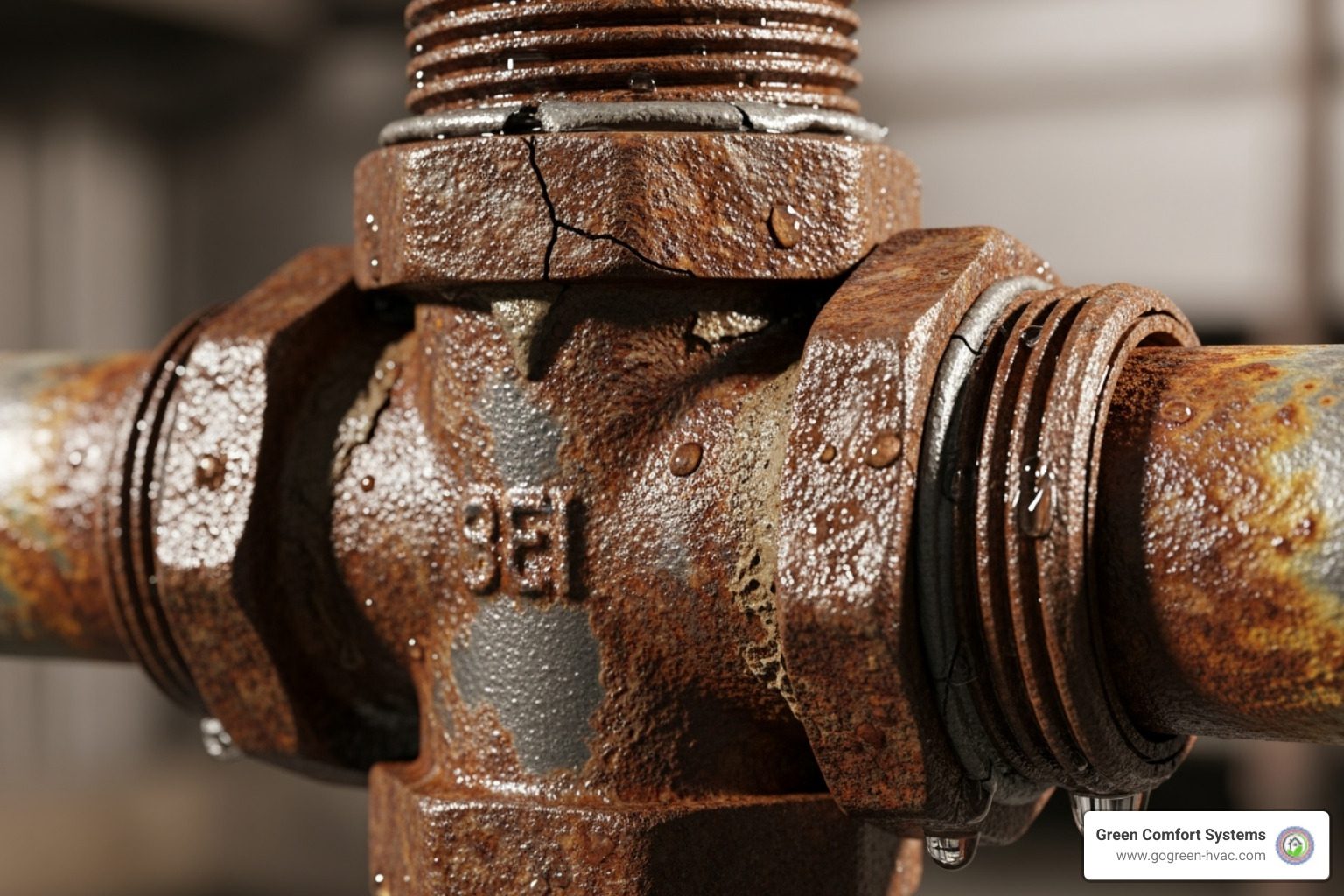
- Aging Infrastructure: Over time, pipes and connections wear down from use and temperature changes. Systems 15-20 years or older are more likely to develop leaks.
- Corrosion: Metal pipes can corrode where they are exposed to moisture, such as where they pass through foundations or in damp environments.
- Improper Installation: Loose fittings, incorrect pipe sizing, or poor sealing during the initial setup can cause leaks years later.
- Physical Damage: This can be caused by excavation without locating utility lines, shifts in a building's foundation, or impacts from equipment.
- Faulty Appliance Connections: The flexible connectors leading to appliances like ovens, water heaters, or boilers can degrade, kink, or loosen over time.
- Material Degradation: Different gas line materials have varying lifespans and vulnerabilities. Some older materials simply wear out after decades of service.
When to Repair vs. When to Replace Your Gas Lines
Deciding whether to repair or replace a gas line requires balancing immediate safety with long-term value. Here are the factors we consider:
- System Age: For a very old system (50+ years), a single leak may indicate widespread weakness. Replacement is often more cost-effective than a series of repairs.
- Extent of Damage: An isolated leak is often a simple repair. Widespread corrosion or damage to multiple sections makes replacement the safer choice.
- Frequency of Repairs: If you're constantly calling for gas line repair on the same line, the system is likely failing. A full replacement will save money and prevent future issues.
- Code Updates: An older system may not meet modern safety standards. A replacement ensures your system is compliant, safer, and more efficient.
- Material Type: Some older pipe materials are less durable than modern options. Upgrading can improve the longevity and safety of your system. For example, pairing new, efficient gas lines with a new boiler makes for a smart overhaul. You can find more information on Boiler Installation to see how a modern system can benefit your property.
The Professional Gas Line Repair Process
When a gas leak occurs, you need a fast, safe, and reliable solution. At Green Comfort Systems, we follow a detailed process for every commercial gas line repair to ensure safety, precision, and full compliance. Our goal is to get your business back up and running safely, with complete peace of mind.
Step 1: Advanced Leak Detection and System Diagnosis
The first step is to pinpoint the exact source of the leak. Our licensed technicians use advanced tools to find even the smallest leaks.
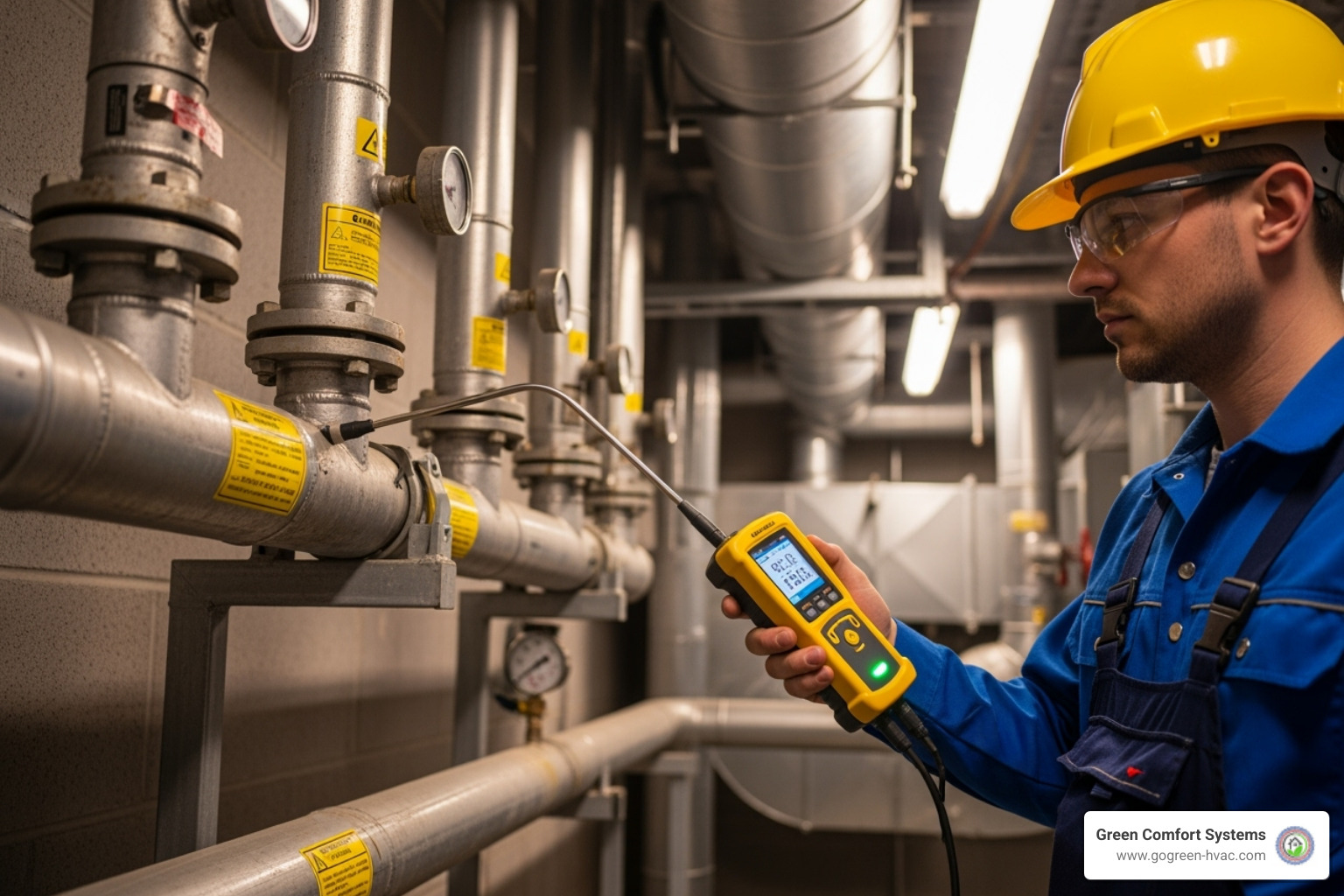
For everyone's safety, we begin by isolating the gas supply at the main meter. We then isolate individual appliances to protect your equipment and focus our tests on the gas piping itself.
Next, we pressurize the gas lines with air to a specific PSI. A drop in pressure indicates a leak. Our technicians use sensitive electronic leak detectors to trace the gas and guide them to the problem area. For visible points, a soapy water test provides clear confirmation—if bubbles form, there's a leak. This thorough approach ensures we know exactly where to perform the repair.
Step 2: Executing a Safe and Compliant Gas Line Repair
Once the leak is located, our certified technicians perform the repair, adhering strictly to safety codes. This is a job for specialists.
Repairs can be minor (tightening a connection, resealing a joint) or major (replacing long sections of pipe, excavating buried lines). Our team is experienced with all common commercial gas line materials, including black iron pipe, flexible CSST (Corrugated Stainless Steel Tubing), copper, and corrosion-resistant polyethylene (PE) and HDPE for underground lines. We will either seal compromised joints or cut out and replace damaged sections with new, compliant material.
Every repair is performed in strict accordance with all local building codes and safety regulations. This ensures the immediate and long-term safety of your system. For all your heating needs, including ensuring your gas lines are in top shape, check out our comprehensive Heating Services.
Step 3: Verification with Pressure and Safety Testing
A gas line repair is not complete until it's thoroughly tested. This step is non-negotiable and provides the ultimate assurance that your system is sealed and safe.
We use a U-gauge manometer to measure pressure with extreme accuracy. The line must hold 15 PSI for a minimum of 15 minutes without any drop. This rigorous test is about 60 times the normal operating pressure and reveals even the tiniest compromises.
Our technicians also perform a full system integrity check, visually inspecting all connections. Once we are satisfied, we re-light all affected gas appliances (boilers, water heaters, etc.) and verify they operate correctly. A final inspection ensures the work area is clean and your property is ready to resume normal operations. We don't consider the job done until your system passes every safety check.
Why Licensed Technicians Are Essential for Commercial Gas Safety
When it comes to commercial gas lines, there is no room for error. Gas line repair demands expertise, training, and attention to detail—qualities only licensed professionals can guarantee. Hiring an expert is not just a good idea; it's a critical business decision that protects your employees, your property, and your peace of mind.
The Dangers of DIY and Unlicensed Work
While the DIY spirit is admirable for many projects, gas line repair is not one of them. The risks are simply too great.
- Fire and Explosion: A small leak can fill an enclosed space with combustible gas. A single spark from a light switch or static electricity can trigger a devastating fire or explosion.
- Carbon Monoxide Exposure: A faulty repair can lead to incomplete combustion, producing this colorless, odorless killer gas. Symptoms like headaches and nausea can be mistaken for the flu until it's too late.
- Legal Liability: As a property owner, you are responsible for maintaining a safe environment. An incident caused by unlicensed work can lead to massive lawsuits and even criminal charges.
- Insurance Invalidation: Most commercial insurance policies exclude coverage for damages resulting from unlicensed work, leaving you personally liable for all costs.
- Code Violations: Improper work will be red-tagged by local authorities, shutting down your business until the violations are corrected by a licensed professional at your expense.
Understanding TSSA and Local Code Compliance
Gas line work is a specialized trade governed by strict safety regulations. Our licensed gas fitters have undergone extensive training on gas systems, pressure requirements, and safety protocols that prevent disasters.
Regulations like TSSA requirements (or those from your local authority) are life-saving protocols that ensure every repair meets the highest safety standards. The local permits and inspection process provides an independent verification that all work is done correctly. This isn't red tape; it's your safety net.
Our commitment to ensuring safety standards means we use only approved materials and proven techniques. Learn more about our company and our dedication to providing safe, reliable HVAC services.
Benefits of Routine Professional Maintenance
Most gas line emergencies are preventable. Regular professional maintenance is the key to catching small problems before they become disasters.
- Preventative Inspections: We examine connections, check for corrosion, and identify vulnerabilities while they are still small, manageable issues.
- Extending System Lifespan: Addressing minor issues prevents major failures, allowing a well-maintained system to operate safely for decades.
- Ensuring Optimal Efficiency: Regular maintenance ensures your gas appliances operate at peak performance, reducing energy waste and lowering your utility bills.
- Peace of Mind: Knowing your gas system has been inspected by licensed professionals lets you focus on your business, not potential disasters.
We recommend annual inspections for most commercial properties. The small investment in maintenance pays enormous dividends in safety, reliability, and cost savings.
Budgeting for Commercial Gas Line Repair Costs
While every gas line repair is unique, understanding the typical cost structure can help you budget for this critical service. Here’s a breakdown of what to expect.
Average Costs for Gas Line Repair Services
Costs for gas line repair vary based on the complexity of the problem. Most service calls begin with a minimum diagnostic fee of around $150 to $200, which covers the technician's time and expertise to safely assess the issue.
- Minor Repairs ($150 - $300): This range typically covers straightforward fixes like tightening a loose fitting or replacing a small, accessible section of pipe.
- Major Repairs ($300 - $3,000+): Costs increase for more complex jobs, such as repairing buried lines, addressing widespread corrosion, or work that requires excavation or opening walls.
- Complete System Replacements ($3,000 - $7,000+): For commercial properties with end-of-life systems, a full replacement is a significant investment that should provide reliable service for decades.
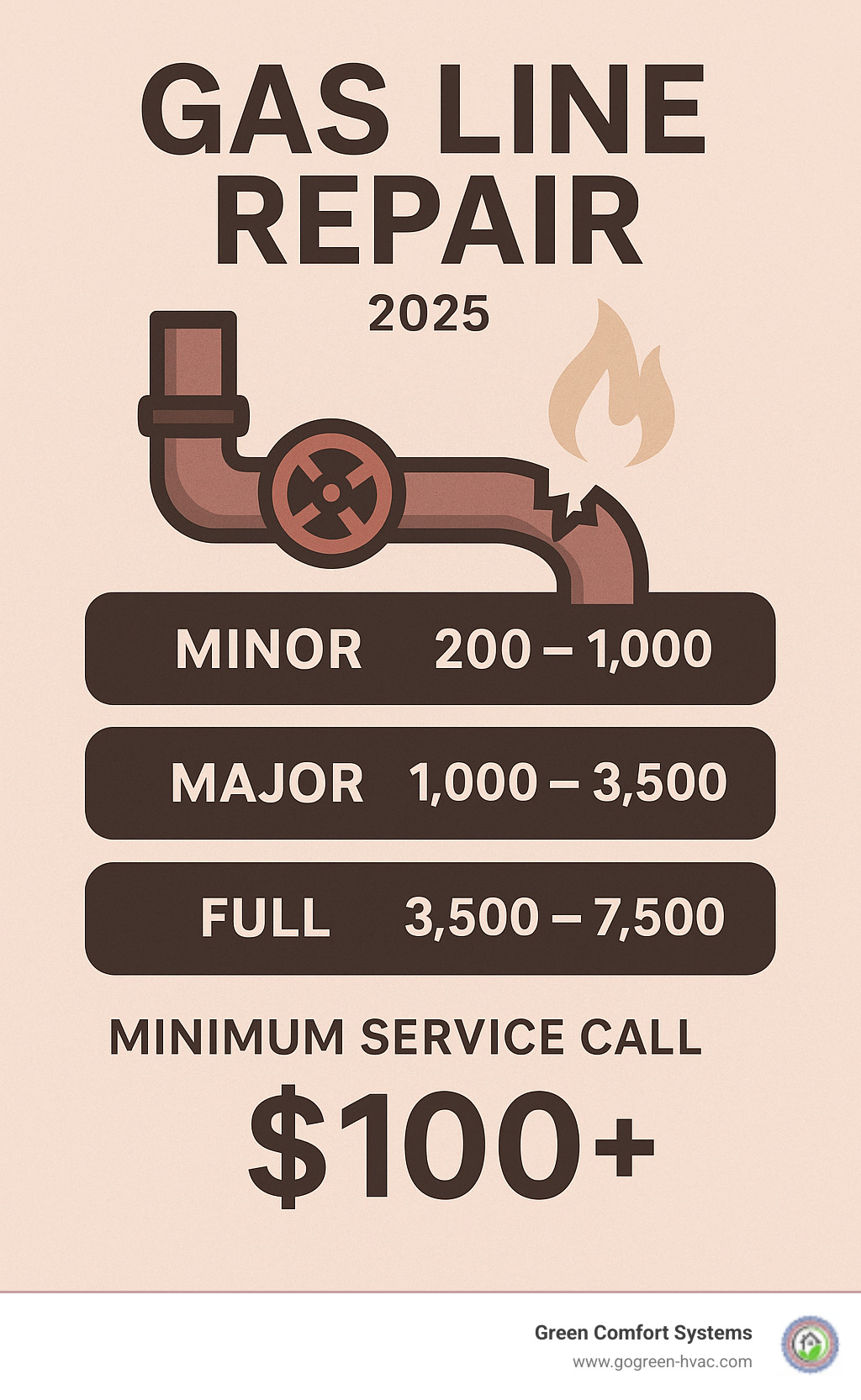
Factors That Influence Your Final Invoice
Several key factors determine the final cost of your repair:
- Accessibility: This is often the biggest cost driver. A line that is hard to reach—behind walls or under concrete—will cost more to repair due to increased labor.
- Materials: The type and quantity of pipe (black iron pipe, CSST, etc.), fittings, and valves needed will affect the total price.
- Labor Rates: Depending on complexity, labor rates typically range from $75 to $150 per hour. Major projects may require multiple technicians.
- Emergency Service: Calls outside of normal business hours will include emergency service fees, usually $200 to $300 on top of repair costs.
- Extent of Damage: A single leak is less costly to fix than multiple leaks or widespread corrosion that compromises the line's integrity.
- Permit Costs: Local authorities may require permits for major repairs or replacements, which adds to the overall cost but ensures the work is code-compliant.
We provide a detailed, transparent estimate before any work begins, so you can make an informed decision with no hidden fees.
Frequently Asked Questions about Gas Line Repair
It's natural to have questions about something as important as your commercial gas lines. We believe in providing clear answers to help you feel confident about your property's safety. Here are some of the most common questions we hear.
Who is responsible for the gas line—the utility company or the property owner?
This is a common question with a clear answer. Your utility company is responsible for the gas lines leading up to and including your gas meter. From the meter into your building, the property owner is responsible for all internal piping, maintenance, and any needed gas line repair.
In a leased space, your agreement may specify whether the landlord or tenant covers the cost, but the property owner holds the ultimate responsibility for ensuring the lines are safe.
How long does a typical gas line repair take?
The timeline for a gas line repair depends on the complexity of the job and the accessibility of the pipes.
- Minor repairs, like tightening a connection or replacing a valve in an accessible area, can often be completed in a few hours.
- Major repairs, such as replacing a long section of pipe or excavating a buried line, can take a full day or more. The need for permits and inspections can also affect the timeline.
Our team prioritizes emergency calls to minimize downtime for your business. We aim for fast dispatch and assessment to get you back to business safely and efficiently.
Can a small, slow gas leak really be dangerous?
Yes, absolutely. It's a dangerous misconception that only large, obvious gas leaks pose a threat. Even a small, slow gas leak is incredibly hazardous and must be addressed immediately.
A slow leak can allow gas to accumulate in an enclosed space, creating a highly flammable or explosive environment that can be ignited by a simple spark. Furthermore, chronic low-level exposure can cause health problems. If the leak leads to incomplete combustion, it can produce deadly carbon monoxide gas, a "silent killer" with subtle symptoms like headaches and fatigue.
If you suspect any gas leak, no matter how small, prioritize safety. Evacuate the building immediately, then call for professional help. It is never worth the risk.
Partner with the Pros for Lasting Peace of Mind
Your commercial property is the heart of your business, where safety and comfort are paramount. When it comes to your gas lines, you need a partner you can trust. Choosing licensed, experienced professionals for gas line repair and maintenance isn't just a good idea—it's crucial for protecting your investment and everyone inside your building.
At Green Comfort Systems, our commitment is to ensure your gas lines are installed, repaired, and maintained to the highest safety and efficiency standards. Our certified technicians bring deep expertise and a dedication to precision, adhering to the strictest regulations. We provide fast, reliable HVAC services in Rosedale, MD, and our surrounding service areas, including Catonsville, Dundalk, Ellicott City, Forest Hill, Glen Burnie, Halethorpe, Joppa, Middle River, Perry Hall, Severna Park, Towson, and Baltimore, MD.
We combine our commitment to your comfort with environmental responsibility—we even plant trees for every service and installation we complete. When your gas systems are efficient and leak-free, it's safer for your business and healthier for our community.
Don't let a gas line issue disrupt your business or compromise safety. Let us provide the expert service and peace of mind you deserve.
Schedule your commercial heating repair in Forest Hill, MD today, or contact us for any of your commercial gas line needs.
Book Expert Service Or Contact Us
Other Blogs





Get Financing Today
Get the comfort you deserve, without the financial stress.

Latest Blogs








